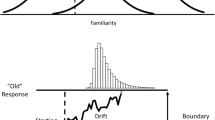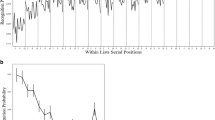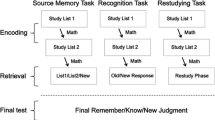Abstract
Dose effects of secobarbital on free recall and recognition of words were examined in levels-of-processing paradigms. Secobarbital significantly impaired recall, even when initial item processing was guided with appropriate orienting tasks. However, when processing was guided both at input (with orienting tasks) and at retrieval (with recognition testing), secobarbital-related retention deficits reported in conventional ‘learn these words’ experiments were not found. Levels-of-processing theory suggests at least two possible mediators for retention deficits associated with drug intoxication, a production deficit at encoding or reduced processing capacity. Neither of these hypotheses can account for the data. A third hypothesis suggests that the intoxicated subject adopts a cautious response-decision strategy, thus failing to emit available items in recall testing or to endorse correct items on recognition. The results of signal detection analysis offered no support for this hypothesis. Considered together with earlier studies, the data indicate that when processing is guided only at retrieval, secobarbital produces both recall and recognition decrements. On the other hand, when processing is guided only at input, the drug produces recall deficits. Apparently, when secobarbital-intoxicated subjects are left to generate their own responses at retrieval, they fail to undertake optimal retrieval strategies. When their processing is guided both at input and retrieval, their drug-induced retention decrements can be corrected.
Similar content being viewed by others
References
Adams RG (1974) Pre-sleep ingestion of two hypnotic drugs and subsequent performance. Psychopharmacologia 40:185–190
Billings CE, Gerke RJ, Wick RL (1975) Comparisons of pilot performance in simulated and actual flight. Aviat Space Environ Med 46:304–308
Blum B, Stern MH, Melville II (1964) A comparative evaluation of the action of depressant and stimulant drugs on human performance. Psychopharmacologia 6:173–177
Buschke H (1973) Selective reminding for analysis of memory and learning. Journal of Verbal Learning and Verbal Behavior 12:543–550
Craik FIM (1977) Similarities between the effects of aging and alcoholic intoxication on memory performance construed within a ‘levels-of-processing’ framework. In: Birnbaum IM, Parker ES (eds) Alcohol and human memory. Lawrence Erlbaum, Hillsdale, pp 9–21
Craik FIM, Lockhart RS (1972) Levels of processing: A framework for memory research. J Verbal Learn Verbal Behav 11:671–684
Craik FIM, Simon E (1980) Age differences in memory: The roles of attention and depth of processing. In: Poon LW, Fozard JL, Cermak LS, Arenberg D, Thompson LW (eds) New directions in memory and aging. Lawrence Erlbaum, Hillsdale, pp 95–111
Craik FIM, Tulving E (1975) Depth of processing and the retention of words in episodic memory. J Exp Psychol (Gen) 104:268–294
Evans WO, Davis KE (1969) Dose-response effects of secobarbital on human memory. Psychopharmacologia 14:46–61
Eysenck MW, Eysenck MC (1979) Processing depth, elaboration of encoding, memory stores and expended processing capacity. J Exp Psychol (Hum Learn) 5:472–484
Fisher RP, Craik FIM (1977) The interaction between encoding and retrieval operations in cued recall. J Exp Psychol (Hum Learn) 3:701–711
Glanzer M, Koppenaal L (1977) The effect of encoding tasks on free recall: Stages and levels. J Verbal Learn Verbal Behav 16:21–28
Mohs RC, Tinklenberg JR, Roth WT, Kopell BS (1980) Sensitivity of some human cognitive functions to effects of methamphetamine and secobarbital. Drug Alcohol Depend 5:145–150
Rundell OH, Williams HL, Lester BK (1977) Comparative effects of alcohol, secobarbital, methaqualone and meprobamate on information processing and memory. In: Gross MM (ed) Alcohol intoxication and withdrawal, vol 85A. Biological aspects of ethanol. Plenum, New York, pp 617–628
Rundell OH, Williams HL, Lester BK (1978) Secobarbital and information processing. Percept Mot Skills 46:1255–1264
Rutschman J, Rubinstein L (1966) Time estimation, knowledge of results and drug effects. J Psychiatr Res 4:107–114
Tharp VK, Rundell OH, Lester BK, Williams HL (1975) Alcohol and secobarbital: Effects on information processing. In: Gross MM (ed) Alcohol intoxication and withdrawal: Experimental studies II. Adv Exp Med Biology, Plenum, New York 59:537–552
Tulving E, Thompson DM (1973) Encoding specificity and retrieval process in episodic memory. Psychol Rev 80:352–373
Williams HL, Rundell OH, Smith LT (1981) Dose effects of secobarbital in a Sternberg memory scanning task. Psychopharmacology 72: 161–165
Winer BJ (1971) Statistical principles in experimental design. McGraw Hill, New York
Author information
Authors and Affiliations
Rights and permissions
About this article
Cite this article
Williams, H.L., Rundell, O.H. Secobarbital effects on recall and recognition in a levels-of-processing paradigm. Psychopharmacology 80, 221–225 (1983). https://doi.org/10.1007/BF00436157
Received:
Accepted:
Issue Date:
DOI: https://doi.org/10.1007/BF00436157




